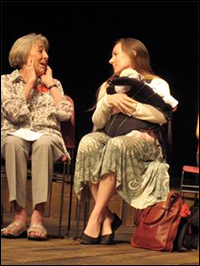available for purchase
at this time.
Link Roundup! – 8/14/15
Link Roundups feature articles and bits of internet goodness that our dramaturgy team digs up. If you find something you want to send our way, drop us a line on Facebook or Twitter!
♦♦♦♦♦
The Nonprofit with Balls blog has a post on what he calls “The Nonprofit Hunger Games”:
We become biased toward those who survive: In the Hunger Games, the youngest kids, the sweetest, kindest ones, are usually the first to get killed. Everyone bets against them. In the Nonprofit Hunger Games, funders bet on which nonprofits are the most “sustainable” and invest in those organizations. Instead of holistically looking at problems and systems, society just funds those organizations we think will be strongest and most likely to survive. And since we fund these more “sustainable” organizations, then of course these organizations are likelier to survive, while the smaller, “weaker” organizations (often led by marginalized communities) are left to struggle. We start to believe that those organizations that survive deserve it, that those who fail also deserve it. But simply because a nonprofit is good at surviving, it does not necessarily mean that it is most effective at solving community problems.
♦♦♦♦♦
Phil Weaver-Stoesz’s essay on HowlRound about delegating tasks has some great reminders for us busy theatre folks:
As artists, we are trained to be recklessly optimistic about how much we can handle. We’re fast learners, we love our art, and we have something big to say, so what can go wrong? We approach the world with laptops in hand, ready to create. The problem is, we burn out. We enter the process full of passion, but halfway through we peeter out in a train wreck of procrastination, fear and self-doubt. I call it, the “Puppydog Black Hole” problem.
♦♦♦♦♦
Playbill has a feature about how theatre artists who are parents handle the challenges of maternity leave and childcare in an industry that is famously terrible at being flexible around the needs of families:
While parental leave affects both men and women in the industry, in some ways its impact is more female-oriented, according to Julia Jordan — namely the lack of child care available for participants of writing workshops. Jordan, a playwright and one of the founders of the Lilly Awards, is working to instigate change in that area. Explaining that many of the workshops require writers to leave their hometowns for several weeks, Jordan detailed that the majority of the workshops do not provide any childcare, nor do they provide housing that a family could live in together if the parents provided their own childcare. “Some people who are childless look at me like I’m crazy,” Jordan said of the conversations she has begun about the subject. “‘Why would any money be devoted to your childcare when it’s your choice to have a child?’ I think it’s so backwards. It’s just wrong.
♦♦♦♦♦
The Kilroys are featured in an article about gender parity in the Hartford Courant:
“Some of the most exciting works today are by women playwrights,” says Edelstein. Among the leading new wave of women playwrights — some of them Pulitzer Prize-winners and finalists — are Sarah Ruhl, Annie Baker, Amy Herzog, Lisa Kron, Halley Feiffer, Sheila Callaghan, Dael Orlandersmith, Danai Gurira, Gina Gionfriddo, Lynn Nottage, Suzan-Lori Parks and Quiara Alegria Hudes, whose Pulitzer Prize-winning “Water by the Spoonful” was commissioned and premiered at Hartford Stage.

